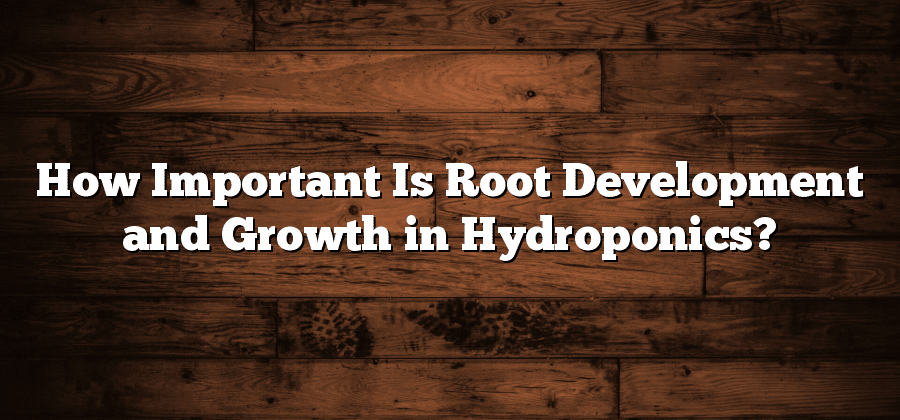Understanding the Significance of Root Development
Root development plays a crucial role in the overall growth and health of plants. Roots are the underground part of the plant that absorb water and nutrients from the soil, providing the plant with the necessary resources for its survival and growth. Without a well-developed root system, plants may struggle to obtain sufficient nutrition and water, resulting in stunted growth or even death.
The significance of root development is particularly important in hydroponic systems, where plants are grown without soil. In these systems, plants rely solely on their root systems to uptake nutrients and oxygen from the water-based nutrient solution. As such, the development of a robust and efficient root system is key to ensuring optimal plant growth and productivity. Hydroponic growers must therefore prioritize the understanding and management of root development to achieve ideal growing conditions and maximize the potential of their crops.
The Role of Root Growth in Hydroponic Systems
Root growth plays a crucial role in hydroponic systems. As the foundation of plant health and productivity, healthy root development directly impacts the overall success of the system. In hydroponics, where plants are grown in a soilless medium and rely on nutrient-rich water for sustenance, the roots are responsible for absorbing essential elements and water, providing stability, and anchoring the plants.
When roots receive the optimal amount of oxygen, nutrients, and water, they are more likely to grow vigorously and efficiently. This, in turn, leads to improved nutrient uptake, stronger resistance to diseases and pests, and enhanced overall plant growth. Additionally, a well-developed root system enables plants to access nutrients more effectively, maximizing their potential for yield and quality. Thus, understanding the dynamics of root growth in hydroponic systems and implementing techniques to promote its health are paramount for achieving success in this method of cultivation.
Factors Affecting Root Development in Hydroponics
Root development in hydroponics is influenced by various factors that are crucial for the growth and overall health of plants. One significant factor is the nutrient solution used. The composition and concentration of the nutrient solution play a vital role in determining the availability and uptake of essential nutrients by the roots. **Balanced nutrient solutions** that provide all the necessary elements in the right proportions are essential for promoting healthy root development. On the other hand, **imbalances** or deficiencies in nutrients can lead to stunted or weak root growth, affecting the plant’s overall performance.
Another factor that affects root development in hydroponics is the **oxygenation of the root zone**. Roots require oxygen for respiration, and adequate oxygen levels are necessary for their proper development. Insufficient oxygen supply to the roots can result in **root rot** and decreased nutrient uptake, leading to poor root growth. Hence, it is crucial to ensure proper aeration and oxygenation of the nutrient solution to support healthy root development in hydroponic systems.
Techniques to Promote Healthy Root Growth
To encourage healthy root growth in hydroponic systems, several techniques can be employed. One effective approach is the use of **aeroponics**, where the roots are suspended in the air and misted with a nutrient solution. This method allows for maximum oxygen exposure to the roots, promoting faster and stronger growth.
Another technique is the implementation of **root zone temperature control**. Maintaining the ideal temperature range for root development is crucial for optimal growth. By adjusting the temperature of the nutrient solution or using specific heating or cooling systems, growers can create an environment conducive to root growth.
Furthermore, **root pruning** is a technique that can enhance root growth in hydroponics. By periodically trimming or removing excess roots, the plant is encouraged to develop a more robust root system. This pruning helps to stimulate the growth of new, healthy roots, resulting in improved nutrient uptake and overall plant health.
In addition, **root zone aeration** is vital for healthy root growth. Ensuring that the root zone is well-aerated promotes the exchange of gases and prevents the accumulation of toxic substances. This can be achieved through different methods such as using air stones or air pumps, which increase the oxygen levels in the nutrient solution and maintain a healthy root environment.
Lastly, **bio-stimulants** can be used to promote healthy root growth. These are natural substances that enhance root development and improve nutrient absorption. Bio-stimulants can be applied through the nutrient solution or as foliar sprays, providing plants with the necessary nutrients and hormones to enhance root growth and strengthen the overall root system.
By employing these techniques, growers can foster strong and healthy root growth in hydroponic systems. This, in turn, leads to increased nutrient uptake, improved plant development, and ultimately, higher yields.






